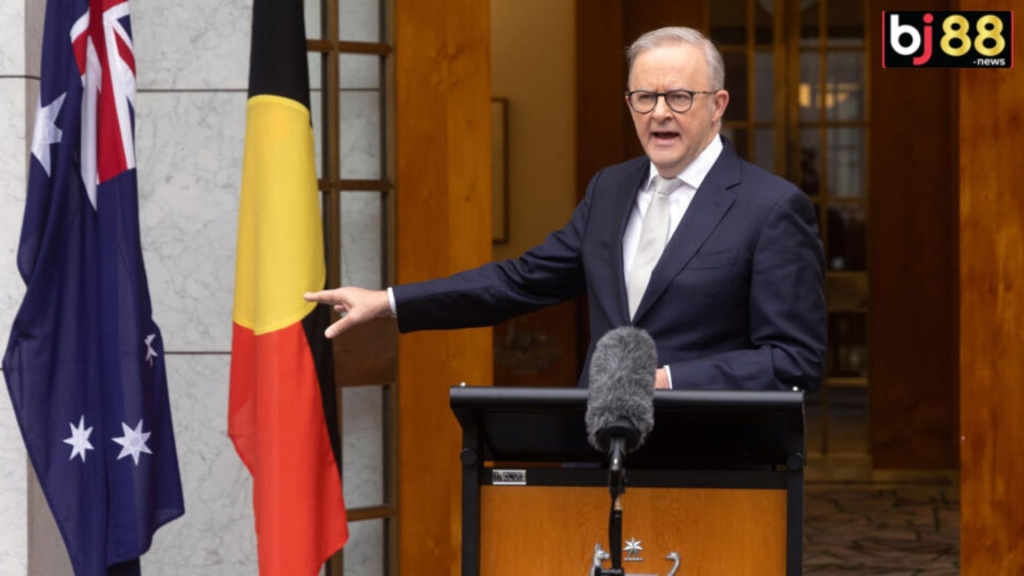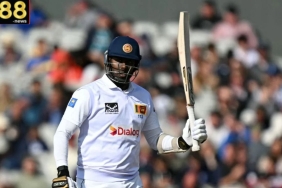When Cyclone Alfred hit Australia’s east coast earlier this month, it disrupted the government’s election plans.
Prime Minister Anthony Albanese was preparing to announce the election date for April, hoping to take advantage of some positive news on interest rates. However, he had to quickly shift his focus to respond to the natural disaster. As one Labor Minister put it, this change of plans was “an act of God.”
This unexpected setback seems to reflect a pattern for Albanese’s government, where big plans are often interrupted by unforeseen challenges, including tough global economic conditions, a cost-of-living crisis affecting many countries, foreign conflicts, post-pandemic issues, national divisions, and now powerful storms.
Albanese, leader of the Labor Party, acknowledged the impact of global conditions when he finally announced the election would be held on May 3.
Despite these obstacles, he believes his party has achieved progress. “Landing where we have is like landing a 747 on a helicopter pad,” he said, pointing to recent improvements in wage growth and a decrease in inflation.
However, Albanese is aiming for a second term to reset his government’s goals.
His main competitor is Peter Dutton, the leader of the Liberal Party, who is part of the Coalition with the National Party of Australia. Just two years ago, Dutton was highly unpopular, but the race has become very close, with the rise of independent and minor parties leading to expectations of a hung parliament.
So, how did things go off course for Albanese?
His victory in May 2022 was seen as a fresh start after nearly a decade of conservative rule. Climate action, addressing the cost-of-living, and restoring leadership stability were key goals.
However, his government’s legacy was meant to focus on Indigenous affairs. In his victory speech, Albanese pledged to hold a historic referendum on an Indigenous Voice to Parliament, an advisory body to advise the government on issues impacting First Nations people.

In 2023, Albanese spent most of his time campaigning for a “Yes” vote, hoping it would lead to constitutional recognition for First Nations people. This was a chance to finally address the relationship between Australia and its Aboriginal and Torres Strait Islander communities, bringing them in line with other former British colonies.
However, the proposal was rejected by a large margin, leaving many Indigenous people feeling disappointed and betrayed. Albanese also faced a tough loss after a challenging campaign.
Some people blamed confusion and misinformation for the result, with about 60% of Australians voting “No.” While Albanese pushed for the “Yes” vote, opposition leader Peter Dutton campaigned for “No,” criticizing Albanese for focusing on the referendum while the cost-of-living crisis worsened.
“[Dutton] not only won on the referendum but also succeeded in positioning Labor as a government not fully focused on Australia’s key issues,” said Kos Samaras, a political consultant and former Labor strategist.
Under Albanese’s leadership, interest rates increased 12 times (with one cut in February), inflation soared after the pandemic, the housing crisis worsened, and Australians began feeling more financially squeezed.
Although the prime minister blames many issues on the previous coalition government, voters now want to know who can best handle them.
In his 2022 victory speech, Anthony Albanese called Australia “the greatest country on earth.” However, many voters are now questioning if that’s still the case—and more importantly, whether traditional politicians can solve the problems.
While many people are frustrated with Labor, this doesn’t necessarily mean they will vote for Dutton’s Coalition.
Support for minor parties and independents was at a record high in the last election, and it’s expected to rise again. If neither major party reaches the required 76 seats in the House of Representatives—something that polls suggest is unlikely—independent candidates could hold the key to forming the next government.
If that happens, Australia would join a global trend of disillusioned voters seeking more radical change. This shift, seen in many countries, can threaten democracy as trust in the system fades.
Despite facing similar challenges, Australia’s unique electoral system has so far prevented the extreme shifts seen in places like the US, France, and Germany.
Experts agree that mandatory voting plays a big role in Australia’s political stability. In the 2022 elections, nearly 90% of eligible voters participated, far higher than the average OECD turnout of 69%. While there is a small A$20 fine for not voting, there is a strong sense of duty to vote.
This system means politicians don’t need to work hard to get voters to the polls – turnout is already guaranteed, so they focus on promoting their message. In places where voting is optional, special interest groups often have more influence because disengaged people skip voting. When everyone votes, regardless of their background, it leads to more representative results.
“Australia’s elections are decided in the middle,” says Antony Green, the country’s chief election analyst. “It’s about getting your message through to those who aren’t closely following the election.”
Experts say one of the key stabilizers in Australian politics is preferential voting, where voters rank candidates by preference. This system has allowed smaller parties like the Greens on the left and One Nation on the right to gain influence, while Labor and the Coalition remain dominant. It helps reduce polarization by encouraging the two major parties to appeal to voters who might not choose them first, which also leads to more balanced policies.
Although the campaign will focus on local issues, candidates would be wise not to ignore global political challenges.

In last year’s presidential election, most analysts didn’t believe a Trump presidency would have a major impact on Australia, given its smaller, distant position. But in today’s fast-paced politics, five months feels like a long time. Every day, Trump makes headlines, and Australians are closely watching.
With Trump’s obvious disregard for long-standing alliances and his constant talk of tariffs and trade wars, Australians are growing concerned about their place in the world, especially regarding their most important diplomatic and military relationships.
Peter Dutton believes he would handle Trump better than Albanese, but there are doubts about anyone truly knowing how to deal with this unpredictable administration. Politicians worldwide are still figuring out how to manage their relationship with the US.
With Albanese kicking off the campaign today, Australians now have just over a month of intense campaigning to decide who they want to lead for the next three years.
Labor’s response to ex-cyclone Alfred has boosted their chances, and the Prime Minister’s approval ratings are at their highest in 18 months. However, recent polls suggest a potential win for Dutton.
The race is still very tight, and the Albanese government could face the difficult challenge of becoming the first to lose a second term since 1931.














